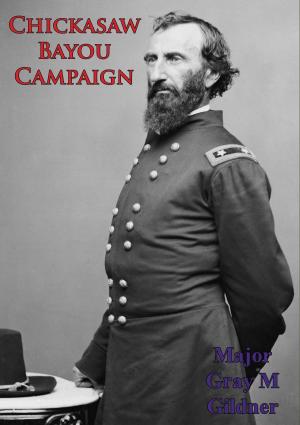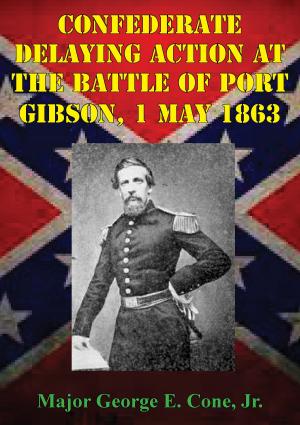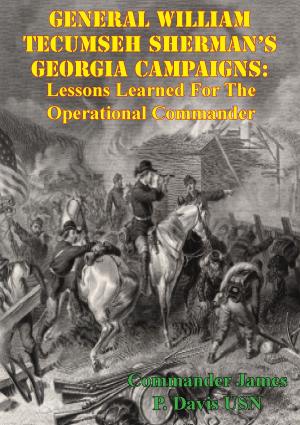Confederate Defense Of Vicksburg: A Case Study Of The Principle Of The Offensive In The Defense
Nonfiction, History, Modern, 19th Century, Americas, United States, Civil War Period (1850-1877), Military| Author: | Major Robert Timothy Howard | ISBN: | 9781782895060 |
| Publisher: | Golden Springs Publishing | Publication: | August 15, 2014 |
| Imprint: | Golden Springs Publishing | Language: | English |
| Author: | Major Robert Timothy Howard |
| ISBN: | 9781782895060 |
| Publisher: | Golden Springs Publishing |
| Publication: | August 15, 2014 |
| Imprint: | Golden Springs Publishing |
| Language: | English |
This study concerns an analysis of the Confederate defense of Vicksburg with respect to one of the nine principles of war, the principle of the offensive. The loss of Vicksburg in the American Civil War was a mortal blow to the Confederacy in that it split the south in two and resulted in the opening of the Mississippi River to the Union forces. During the Campaign for Vicksburg General Grant, leading a Union army engaged General Pemberton, commanding a Confederate army, and proceeded to win one of the most brilliant military successes in history. A distinct contrast in aggressiveness appeared to exist between Grant and Pemberton during this campaign; because once Grant landed his army in Confederate territory, he retained the initiative and kept Pemberton at his mercy. Pemberton was unable to overcome the difficulties he experienced and received little help from outside his command. Finally, because of despair among his men, he surrendered Vicksburg to the Union on July 4, 1863...Certain "actions" that can be taken by a commander relative to the principle of the offensive in the defense and certain "factors" which may prevent his taking these actions are identified and employed in the analysis. Among the more important conclusions of the thesis are: 1.) The Confederate commander at Vicksburg applied the principle of the offensive against Grant’s initial probes into Mississippi and against Federal cavalry raids into Vicksburg area. 2.) The Confederate commander at Vicksburg did not apply the principle of the offensive against Grant’s army during the final Union thrust for Vicksburg (May 1 to July 4, 1863). Several of General Pemberton’s subordinate commanders, however, did apply the principle during this same period. 3.) The primary reasons for Pemberton’s failures with respect to the application of the principle of the offensive were his lack of intelligence resulting from his lack of cavalry and interference with his command decisions from higher authority.
This study concerns an analysis of the Confederate defense of Vicksburg with respect to one of the nine principles of war, the principle of the offensive. The loss of Vicksburg in the American Civil War was a mortal blow to the Confederacy in that it split the south in two and resulted in the opening of the Mississippi River to the Union forces. During the Campaign for Vicksburg General Grant, leading a Union army engaged General Pemberton, commanding a Confederate army, and proceeded to win one of the most brilliant military successes in history. A distinct contrast in aggressiveness appeared to exist between Grant and Pemberton during this campaign; because once Grant landed his army in Confederate territory, he retained the initiative and kept Pemberton at his mercy. Pemberton was unable to overcome the difficulties he experienced and received little help from outside his command. Finally, because of despair among his men, he surrendered Vicksburg to the Union on July 4, 1863...Certain "actions" that can be taken by a commander relative to the principle of the offensive in the defense and certain "factors" which may prevent his taking these actions are identified and employed in the analysis. Among the more important conclusions of the thesis are: 1.) The Confederate commander at Vicksburg applied the principle of the offensive against Grant’s initial probes into Mississippi and against Federal cavalry raids into Vicksburg area. 2.) The Confederate commander at Vicksburg did not apply the principle of the offensive against Grant’s army during the final Union thrust for Vicksburg (May 1 to July 4, 1863). Several of General Pemberton’s subordinate commanders, however, did apply the principle during this same period. 3.) The primary reasons for Pemberton’s failures with respect to the application of the principle of the offensive were his lack of intelligence resulting from his lack of cavalry and interference with his command decisions from higher authority.


![Cover of the book Staff Ride Handbook For The Battle Of Shiloh, 6-7 April 1862 [Illustrated Edition] by Major Robert Timothy Howard](https://www.kuoky.com/images/2014/august/300x300/9781782895305-0ab4_300x.jpg)
![Cover of the book Staff Ride Handbook For The Battle Of Chickamauga, 18-20 September 1863 [Illustrated Edition] by Major Robert Timothy Howard](https://www.kuoky.com/images/2014/august/300x300/9781782895275-5w82_300x.jpg)


![Cover of the book Staff Ride Guide - The Battle Of First Bull Run [Illustrated Edition] by Major Robert Timothy Howard](https://www.kuoky.com/images/2014/august/300x300/9781782894599-MCut_300x.jpg)








